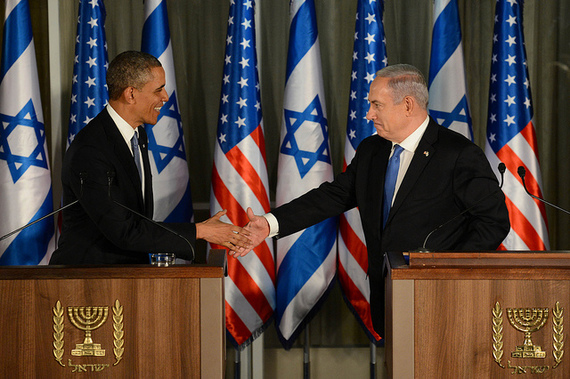 Prime Minister Benjamin Netanyahu and US President Barack Obama holding a joint press conference at the Prime minister's residence in Jerusalem. March 20, 2013.
Prime Minister Benjamin Netanyahu and US President Barack Obama holding a joint press conference at the Prime minister's residence in Jerusalem. March 20, 2013.
(Photo by Kobi Gideon / GPO)
The agreement between Iran and the P5+1 will determine the future of Iran's nuclear program for the next few decades. While negotiations were still under way, Israeli PM Netanyahu declared that the deal even as it was taking shape spelled an end to the State of Israel. Most of the Israeli center-left opposition has since joined in the doomsday predictions. However, senior officials in Israel's defense establishment hold that the deal would actually reduce the threat posed by Iran, freeing resources to deal with other threats.
Conversations with senior security experts indicate that many of them share the view that given the realistic alternatives, the deal is in fact good for Israel's security. A sober analysis of the agreement announced last week confirms this judgment:
1. According to the terms of the agreement, Iran will require one year to accumulate the fissile material needed to create a nuclear device and will stay in that position for ten years, under close supervision. After that timeframe elapses, international supervision will continue.
2. When talks began, Iran was a month and a half away from accumulating the amount of material needed for assembling a nuclear weapon. Had negotiations, adamantly opposed by Netanyahu, never begun, Iran would now be even closer to that point. Thanks to the talks, Iran's nuclear program has been scaled back for the first time in over a decade. In other words, if the West had heeded Netanyahu's advice and not begun the last round of negotiations, Iran would now be much closer to achieving military nuclear capabilities.
3. Netanyahu claims that the agreement places Iran on the nuclear threshold in ten years - but without the deal, it would be there by now.
4. By adopting a rejectionist approach to the entire negotiation process, Netanyahu forfeited any way of influencing and improving the agreement. He also undercut Israel's ability to coordinate intelligence supervision over Iran with global partners, and limited the potential security guarantees that Israel would receive following a deal.
- An Israeli strike in Iran. Assuming that such an attack is still possible, it is not clear how effective it would be in stopping Iran's nuclear program. Even in a very optimistic scenario, it would result in a two-year delay of the program rather than its elimination. After those two years, Iran would again be able to develop its program, but this time armed with a brilliant excuse. Indeed, many experts believe that Iran would expedite its military nuclear program should such an attack occur. Moreover, attacking Iran would potentially embroil Israel in a war with Iran and Hezbollah, possibly also reigniting the Gaza front in a confrontation with Iranian subsidiary Islamic Jihad. All this besides the billions of dollars that Israel would spend in retaining military readiness for such an attack, instead of directing them to other military or civilian needs.
- An American strike in Iran. The U.S. has the military capacity to significantly hurt Iran and buy an estimated four-year hiatus in its nuclear program. However, the current administration is not seriously considering such an attack, nor did the previous one under George W. Bush. Americans are tired of the Iraqi mire created by false allegations concerning weapons of mass destruction; they are not eager to engage in yet another Middle East war. Internationally, too, American credibility suffered a major blow when the WMD claim about Iraq was shown to be false. The vast majority of Americans support a deal with Iran, despite their mistrust of Tehran and support for Israel. In these circumstances, the chances of a U.S. administration launching an attack on Iran are miniscule. Signing a deal, on the other hand, would provide the U.S. with domestic and international legitimacy to attack, should Iran violate the agreement and may give the American public the time it needs to seriously consider such a move.
- Continued international sanctions on Iran. One reason that the sanctions against Iran have been effective is the international consensus they garnered, including Russia and China. This global agreement was forged by Iran's rejection of compromise talks held with the U.S. when Obama entered office, and was complemented by Iranian violations of international law. However, the point of the sanctions was to force Iran to negotiate, and they cannot be maintained - certainly not exacerbated - if that goal is no longer relevant. It is easy to forget that before the talks, Iran was in a more advanced position than it is now. Without the deal, Israel could not be assured that it would catch Iranian violations in time to stop them and would be forced to resort to either an attack, with all the negative ramifications that would entail, or to come to terms with a nuclear Iran. Moreover, in this scenario, even if the sanctions were to eventually compel Iran to negotiate, its nuclear progress would place it in a stronger negotiation position. Keeping up the sanctions would not have stopped Iran's nuclear program, and despite Netanyahu's claims on the matter would not have promoted a better deal in future, and might even have weakened international and Israeli positions in any future negotiations.